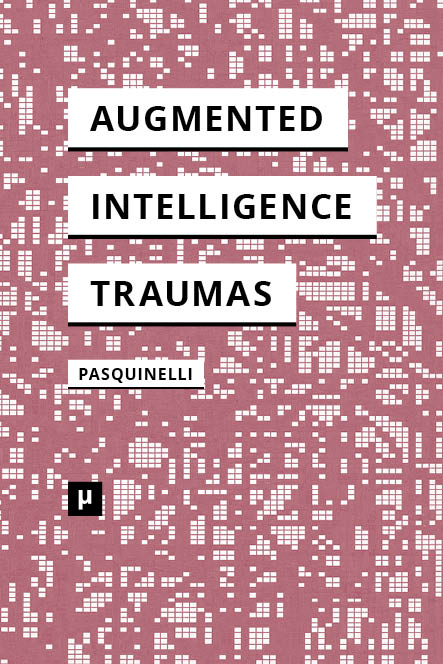Thomas Patteson: Instruments for New Music: Sound, Technology, and Modernism (2015)
Filed under book | Tags: · electric music, machine, media, media technology, modernism, music, music history, musical instruments, radio, sound, sound recording, technology, weimar republic

“Player pianos, radio-electric circuits, gramophone records, and optical sound film—these were the cutting-edge acoustic technologies of the early twentieth century, and for many musicians and artists of the time, these devices were also the implements of a musical revolution. Instruments for New Music traces a diffuse network of cultural agents who shared the belief that a truly modern music could be attained only through a radical challenge to the technological foundations of the art. Centered in Germany during the 1920s and 1930s, the movement to create new instruments encompassed a broad spectrum of experiments, from the exploration of microtonal tunings and exotic tone colors to the ability to compose directly for automatic musical machines. This movement comprised composers, inventors, and visual artists, including Paul Hindemith, Ernst Toch, Jörg Mager, Friedrich Trautwein, László Moholy-Nagy, Walter Ruttmann, and Oskar Fischinger. Patteson’s fascinating study combines an artifact-oriented history of new music in the early twentieth century with an astute revisiting of still-relevant debates about the relationship between technology and the arts.”
Publisher University of California Press, Nov 2015
Creative Commons Attribution Noncommercial ShareAlike 4.0 license.
ISBN 9780520963122 (EPUB), 9780520963122 (PDF)
250 pages
Matteo Pasquinelli (ed.): Alleys of Your Mind: Augmented Intelligence and Its Traumas (2015)
Filed under book | Tags: · algorithm, artificial intelligence, brain, cognition, computation, cybernetics, technology, thinking

“One day, it will not be arbitrary to reframe twentieth century thought and its intelligent machines as a quest for the positive definition of error, abnormality, trauma, and catastrophe—a set of concepts that need to be understood in their cognitive, technological and political composition. It may be surprising for some to find out that Foucault’s history of biopower and technologies of the self share common roots with cybernetics and its early error friendly universal machines. Or to learn that the desiring machines, which “continually break down as they run, and in fact run only when they are not functioning properly” (Deleuze and Guattari), were in fact echoing research on war traumas and brain plasticity from the First World War. Across the history of computation (from early cybernetics to artificial intelligence and current algorithmic capitalism) both mainstream technology and critical responses to it have shared a common belief in the determinism and positivism of the instrumental or technological rationality, to use the formulations of the Frankfurt School. Conversely, the aim of this anthology is to rediscover the role of error, trauma and catastrophe in the design of intelligent machines and the theory of augmented cognition. These are timely and urgent issues: the media hype of singularity occurring for artificial intelligence appears just to fodder a pedestrian catastrophism without providing a basic epistemic model to frame such an “intelligence explosion”.”
With texts by Benjamin Bratton, Orit Halpern, Adrian Lahoud, Jon Lindblom, Catherine Malabou, Reza Negarestani, Luciana Parisi, Matteo Pasquinelli, Ana Teixeira Pinto, Michael Wheeler, Charles Wolfe, and Ben Woodard.
Publisher meson.press, Lüneburg, November 2015
Creative Commons BY-SA 4.0 License
ISBN 9783957960658 (print) 9783957960665 (PDF)
212 pages
monochrom, 11-23 (2000-2004) [German]
Filed under magazine | Tags: · art, conspiracy, copyleft, copyright, media, media art, media culture, net culture, philosophy, politics, science fiction, software, subversion, surveillance, tactical media, technology


The mouthpiece of an international art-technology-philosophy collective founded in 1993, with its headquarters at Museumsquartier in Vienna.
“Das Fanzine monochrom ist ein im Telefonbuch-Format erscheinendes Zeitschriftenobjekt, das von der gleichnamigen Künstler_innengruppe aus Wien, Graz und Bamberg/Deutschland herausgegeben wird. monochrom ist ein Potpourri der digitalen und analogen Subversion, ein unnostalgisches Amalgam aus 125 Jahren abendländischer Gegenkultur, die Godzilla-Variante der gutbügerlichen Coffeetablebuch-Idee.”
Editor-in-chief: Johannes Grenzfurthner
Publisher monochrom, Vienna
ISSN 1024-6738
Publisher, (2)
monochrom on Wikipedia
PDF (No. 11-14: Ontologisches Sanierungsportfolio, 2000, 260 pp)
PDF (No. 15-23: Zweite Ordnung muss sein, 2004, 436 pp)

